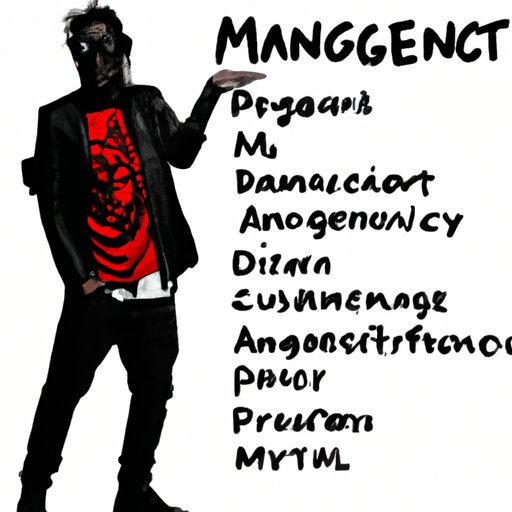Introduction
In the music industry, an artist manager is a professional who oversees the career of an artist or band. They are responsible for a wide range of tasks related to the artist’s career, from setting up gigs and tours to negotiating deals and contracts. In this article, we will explore what an artist manager does and how to become one.

Exploring What an Artist Manager Does
An artist manager is responsible for overseeing all aspects of an artist’s career. They must be able to handle the business side of the music industry, such as dealing with contracts and finances, as well as the creative side, such as promoting and marketing the artist. An artist manager must have a good understanding of the music industry and be able to make decisions that are in the best interests of their client.
Overview of Responsibilities
The primary responsibility of an artist manager is to help their client reach their goals. This includes helping them to develop their career by setting up gigs and tours, negotiating deals and contracts, managing finances and accounts, and promoting and marketing the artist. An artist manager must also have a good understanding of the music industry, as they will need to be able to identify opportunities and provide advice on the best way to move forward.
Breakdown of Typical Tasks
The typical tasks of an artist manager include:
- Setting up gigs and tours
- Negotiating deals and contracts
- Managing finances and accounts
- Promoting and marketing the artist
- Identifying opportunities and providing advice
- Networking with industry professionals
- Maintaining relationships with clients
- Ensuring deadlines are met
- Providing emotional support

The Roles and Responsibilities of an Artist Manager
Setting Up Gigs and Tours
One of the primary responsibilities of an artist manager is to set up gigs and tours for their client. This involves booking venues, arranging transportation, and ensuring that all necessary equipment is available. The artist manager must also be able to negotiate fees and ensure that all legal requirements are met.
Negotiating Deals and Contracts
An artist manager must be able to negotiate deals and contracts on behalf of their client. This includes securing royalties, licensing agreements, and other types of business arrangements. The artist manager must also be familiar with the legal requirements associated with these agreements.
Managing Finances and Accounts
An artist manager is also responsible for managing their client’s finances and accounts. This includes budgeting, paying bills, and keeping track of income and expenses. The artist manager must also be knowledgeable about tax laws and regulations.
Promoting and Marketing the Artist
Another important role of an artist manager is to promote and market the artist. This includes creating press releases, booking interviews and appearances, and managing social media accounts. The artist manager must also be able to identify potential promotional opportunities and take advantage of them.
Understanding the Artist Manager-Artist Relationship
An artist manager must be able to establish trust and communication with their client. This means being honest and upfront about expectations, goals, and objectives. The artist manager must also be able to provide emotional support and guidance when needed.
It is also important for the artist manager to set clear goals and expectations for their client. This may include setting a timeline for the release of new music or developing an overall strategy for the artist’s career. The artist manager must be able to communicate these goals clearly and ensure that they are met.
How to Become an Artist Manager
Becoming an artist manager requires a certain set of qualifications and skills. These include knowledge of the music industry, strong communication and interpersonal skills, and the ability to negotiate deals and contracts. An artist manager must also be knowledgeable about copyright law and contracts.
To become an artist manager, it is also important to acquire the necessary education and training. This may include completing a college degree or taking courses in the music industry. It is also useful to have experience working in the music industry or managing artists.

Identifying the Challenges of an Artist Manager
Being an artist manager can be a challenging job. Working long hours and dealing with difficult clients are just some of the challenges faced by artist managers. Additionally, they must stay up to date with industry trends and developments in order to remain competitive.
Examining the Benefits of Being an Artist Manager
Despite the challenges, there are many rewards to being an artist manager. Professional opportunities such as networking with industry professionals and building lasting connections are just some of the benefits of the job. Additionally, artist managers have the opportunity to express their creativity and have a direct impact on their client’s success.
Conclusion
An artist manager is an essential part of the music industry. They are responsible for a wide range of tasks related to the career of an artist, from setting up gigs and tours to managing finances and accounts. Becoming an artist manager requires certain qualifications and skills, as well as education and training. Although it can be challenging, being an artist manager can also be rewarding and offers the opportunity to build lasting connections in the music industry.
(Note: Is this article not meeting your expectations? Do you have knowledge or insights to share? Unlock new opportunities and expand your reach by joining our authors team. Click Registration to join us and share your expertise with our readers.)
